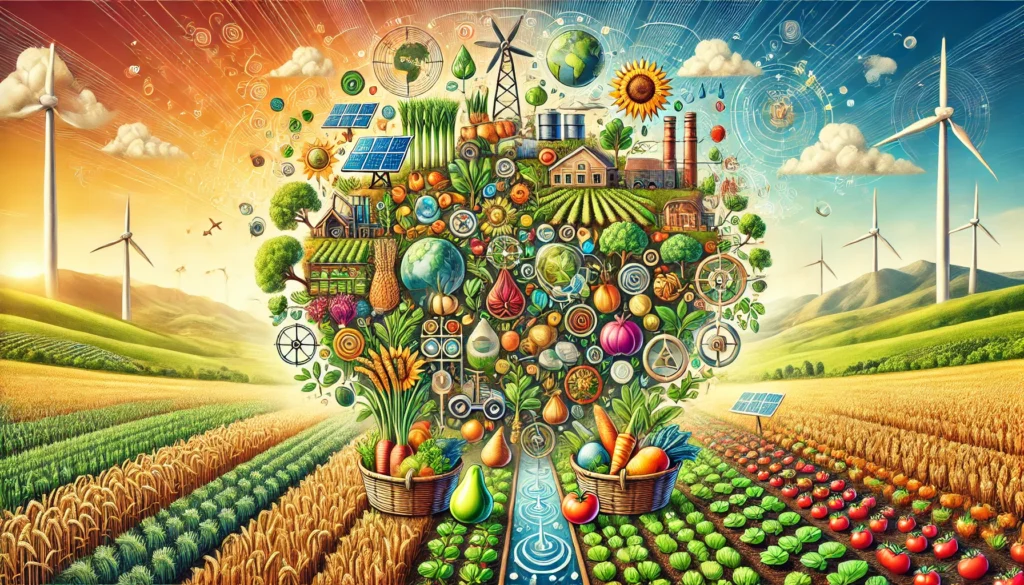Physical Address
304 North Cardinal St.
Dorchester Center, MA 02124
Network
Physical Address
304 North Cardinal St.
Dorchester Center, MA 02124
Network

With an ever-growing global population, it is becoming increasingly important to ensure food security while safeguarding the planet.Sustainable agriculture can achieve this by advocating for farming practices that meet current needs without compromising future generations’ ability to meet their own. Thane Ritchie — a shrewd investor in sustainable technologies — recognizes that sustainable agriculture is key in addressing both food security and environmental challenges.“Investing into sustainable agriculture is really about creating resilient food systems which can withstand climate change impacts as well as conserve our natural resources,” says Ritchie.
Conventional farming often leads to soil degradation, water scarcity, and increased greenhouse gas emissions. The aim of sustainable agriculture is to mitigate these problems through using methods that foster environmental wellness, economic viability and social equity.
| Principle | Description | Benefits |
|---|---|---|
| Soil Health | Practices that maintain or improve soil fertility and structure. | Increased crop yields, reduced erosion, and improved water retention. |
| Water Management | Efficient use of water resources to minimize waste. | Conservation of water, reduced irrigation costs. |
| Biodiversity | Enhancing the diversity of crops and livestock. | Improved ecosystem resilience, reduced pest and disease outbreaks. |
| Integrated Pest Management (IPM) | Combining biological, cultural, and mechanical control methods to manage pests. | Reduced reliance on chemical pesticides, lower environmental impact. |
Conservation farming entails minimum soil disturbance; maintaining soil cover; crop rotation so as to improve soil health and productivity among other things like moisture retention reduction on erosion increase in biodiversity etcetera.
Example: Cover crops such as clover or legumes which protect against erosion, fix nitrogen thereby enhancing soil fertility while also improving infiltration capacity of water into soils.
Agroforestry involves integrating trees and shrubs within agricultural landscapes. This practice helps diversify species composition at different trophic levels leading improved nutrient cycling; enhances biodiversity conservation efforts; contributes towards better carbon sequestration potentials due multi-storeyed structure associated with agroforests thus providing additional income streams from timber production or non-timber forest products (NTFPs).
Example: Plantation establishment around crop fields/pastures where livestock would benefit shade provision services rendered by such trees planted around them thus micro climates being enhanced too besides acting windbreaks against soil erosion.
IPM combines biological control methods with cultural and mechanical means so that pests are managed sustainably. It reduces chemical pesticide reliance which may have adverse effects on environment or human health.
Example: Use of ladybugs as natural enemies for aphids control in vegetable gardens; rotation resistance varieties among crops etcetera being some components integrated pest management approaches used by farmers to minimize infestation levels caused by various insect pests.
Precision agriculture employs advanced technologies like GPS, remote sensing, data analytics for making best decisions regarding crop husbandry practices at individual field scale which leads to efficient use of resources thus reducing waste generation while minimizing ecological footprint associated with conventional farming systems.
Example: Drones fitted out with multispectral sensors capable monitoring crop health status together soil condition variations thereby enabling precise application water fertilizers pesticides only where they’re needed most by plants growing there hence saving time energy costs involved during such operations through this innovation.
While sustainable agriculture has many advantages, there are also some challenges that need to be overcome such as expensive investments at the beginning, technological obstacles as well as policy support required. On the other hand, this industry offers great potential for innovation and growth. Governments should work together with private sectors and investors so that they can establish enabling policies and investment frameworks which will enhance development and adoption of sustainable agricultural practices.
In order for sustainable agriculture to be widely embraced, it needs strong support from appropriate policies. This involves promoting environmentally friendly farming methods through incentives; supporting research & development (R&D) financially by giving subsidies on them among others things like making laws that encourage good environmental management practices.Public-private partnerships can be used as a way of funding large scale projects towards sustainability in agriculture.
Sustainable agriculture will continue evolving hence its future lies in constant improvement coupled with use of modern technologies. Some emerging trends include coming up with crops which can survive under different climatic conditions; better ways of monitoring soil health; urban farming expansion etcetera.Thane Ritchie thinks these areas should receive continuous backing since they contribute greatly towards worldwide food security besides protecting our environment.
Climate change presents a big challenge thus necessitating environmental friendly farming methods able to address it while ensuring sustenance of future generations’ food requirements. Conservation agriculture innovations alongside other things such as agroforestry integrated pest management; precision agriculture offer promising solutions towards resilient food systems creation.For investors like Thane Ritchie therefore supporting these inventions is not only strategic financially but also serves as an indication for promoting sustainability within communities where we live.As long as new ideas keep coming up about how best we can do things differently in terms of producing safe nutritious foods then mankind will always move forward closer to achieving safer more sustainable world.There is no doubt that.